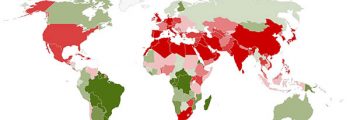1990
Mathis Wackernagel started his doctoral research on measuring human carrying capacity with Prof. William Rees at the University of British Columbia.
1992
First academic publication with the term “ecological footprint” inspired by the “small footprint” of the new computer on Rees’ desk.
Read more1995
Our Ecological Footprint—the first book published on the topic.
2000
Ecological Footprint starts complementing the Living Planet Index in WWF’s Living Planet Report.
2002
First Ecological Footprint online calculator.
2003
Mathis Wackernagel, Susan Burns, and Steve Goldfinger founded Global Footprint Network. Its focus: to make global ecological limits central to decision-making. Received support of over 70 partner organizations and over 20 international senior advisors.
Read more2005
Set goal to complete 10 national Footprint applications within 10 years (ten-in-ten).
2006
First Ecological Footprint Forum titled “Learn Share Connect”, co-organized with the University of Siena and held in Siena and Colle di Val D’Elsa, ITALY, on 16-17 June 2006.
Read more2006
First annual Earth Overshoot Day Campaign.
2007
First animated Footprint Calculator launched.
2007
Global Footprint Network and its founders received the Skoll Award for Social Entrepreneurship.
2007
First academic conference on the Ecological Footprint co-organized by BRASS (the Centre for Business Relationships, Accountability, Sustainability and Society) and Global Footprint Network. The conference was titled “International Ecological Footprint Conference – Stepping up the Pace: New Developments in Ecological Footprint Methodology, Policy & Practice” and was held on 8-10 May 2007 in Cardiff, Wales.
Read more2007
Launch of the Al Basma Al Beeiyah (Ecological Footprint) Initiative in the United Arab Emirates in September 2007.
2008
Global Footprint Network became a partner of the Biodiversity Indicator Partnership (BIP), thus helping this partnership and the CBD to monitor global progresses against the 2010 Biodiversity Targets first and then towards the Aichi Targets.
Read more2009
Latest Ecological Footprint standards are launched.
2010
2nd Ecological Footprint Forum titled “The opportunity of Limits”, co-organized with the University of Siena and held in Siena and Colle di Val D’Elsa, Italy, on 7-11 June 2010.
Read more2012
Global Footprint Network receives Kenneth Boulding Award, Blue Planet Prize and Binding Conservation Award.
2012
Concluding conference of our Mediterranean initiative. This conference was organized by Global Footprint Network and UNESCO and was held in Venice, Italy, on 1-2 October 2012. The conference was titled “Securing Competitiveness for the Mediterranean. Exploring Ecological Footprint and biocapacity trends and their implications for the Mediterranean” and marked two important milestones for the region: 1) the first ever Mediterranean Footprint report was launched, 2) a decision was taken to turn the Med initiative into a proper regional program of Global Footprint Network.
Read more2013
Completed twelfth national Footprint application within 8 years.
2014
Co-founders Mathis Wackernagel and Susan Burns inducted into the ISSP Sustainability Hall of Fame.
Read more2016
First nations land claim ruling in Canada uses Ecological Footprint.
2016
Showed impact of resource performance on financial risks.
2017

Launched Footprint Explorer open data platform: makes available Footprint and biocapacity data for more than 200 countries.
Read more2018
2018 edition of National Footprint Accounts is published – with more countries covered than ever.
2018
Began Ecological Footprint Initiative with York University in Toronto to make independent entity to produce National Footprint Accounts.


